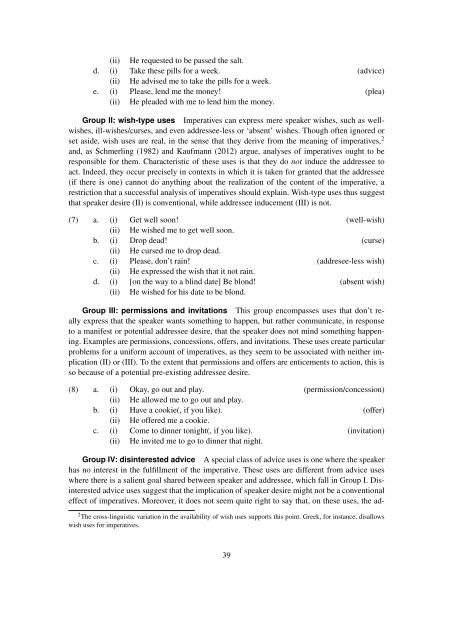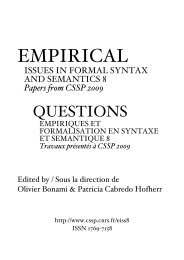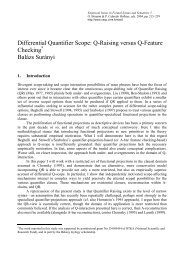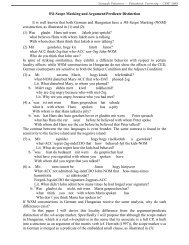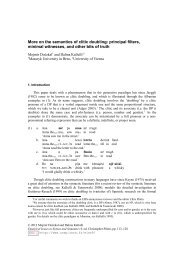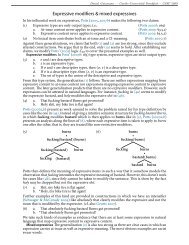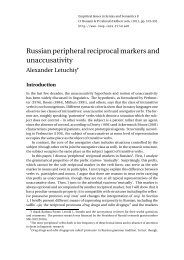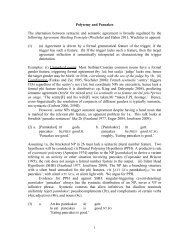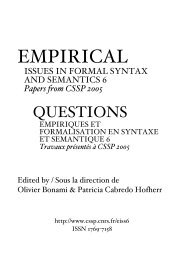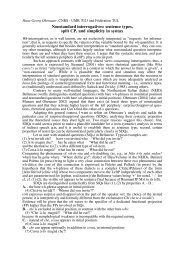Empirical Issues in Syntax and Semantics 9 (EISS 9 ... - CSSP - CNRS
Empirical Issues in Syntax and Semantics 9 (EISS 9 ... - CSSP - CNRS
Empirical Issues in Syntax and Semantics 9 (EISS 9 ... - CSSP - CNRS
You also want an ePaper? Increase the reach of your titles
YUMPU automatically turns print PDFs into web optimized ePapers that Google loves.
(ii) He requested to be passed the salt.<br />
d. (i) Take these pills for a week. (advice)<br />
(ii) He advised me to take the pills for a week.<br />
e. (i) Please, lend me the money! (plea)<br />
(ii) He pleaded with me to lend him the money.<br />
Group II: wish-type uses Imperatives can express mere speaker wishes, such as wellwishes,<br />
ill-wishes/curses, <strong>and</strong> even addressee-less or ‘absent’ wishes. Though often ignored or<br />
set aside, wish uses are real, <strong>in</strong> the sense that they derive from the mean<strong>in</strong>g of imperatives, 2<br />
<strong>and</strong>, as Schmerl<strong>in</strong>g (1982) <strong>and</strong> Kaufmann (2012) argue, analyses of imperatives ought to be<br />
responsible for them. Characteristic of these uses is that they do not <strong>in</strong>duce the addressee to<br />
act. Indeed, they occur precisely <strong>in</strong> contexts <strong>in</strong> which it is taken for granted that the addressee<br />
(if there is one) cannot do anyth<strong>in</strong>g about the realization of the content of the imperative, a<br />
restriction that a successful analysis of imperatives should expla<strong>in</strong>. Wish-type uses thus suggest<br />
that speaker desire (II) is conventional, while addressee <strong>in</strong>ducement (III) is not.<br />
(7) a. (i) Get well soon! (well-wish)<br />
(ii) He wished me to get well soon.<br />
b. (i) Drop dead! (curse)<br />
(ii) He cursed me to drop dead.<br />
c. (i) Please, don’t ra<strong>in</strong>! (addresee-less wish)<br />
(ii) He expressed the wish that it not ra<strong>in</strong>.<br />
d. (i) [on the way to a bl<strong>in</strong>d date] Be blond! (absent wish)<br />
(ii) He wished for his date to be blond.<br />
Group III: permissions <strong>and</strong> <strong>in</strong>vitations This group encompasses uses that don’t really<br />
express that the speaker wants someth<strong>in</strong>g to happen, but rather communicate, <strong>in</strong> response<br />
to a manifest or potential addressee desire, that the speaker does not m<strong>in</strong>d someth<strong>in</strong>g happen<strong>in</strong>g.<br />
Examples are permissions, concessions, offers, <strong>and</strong> <strong>in</strong>vitations. These uses create particular<br />
problems for a uniform account of imperatives, as they seem to be associated with neither implication<br />
(II) or (III). To the extent that permissions <strong>and</strong> offers are enticements to action, this is<br />
so because of a potential pre-exist<strong>in</strong>g addressee desire.<br />
(8) a. (i) Okay, go out <strong>and</strong> play. (permission/concession)<br />
(ii) He allowed me to go out <strong>and</strong> play.<br />
b. (i) Have a cookie(, if you like). (offer)<br />
(ii) He offered me a cookie.<br />
c. (i) Come to d<strong>in</strong>ner tonight(, if you like). (<strong>in</strong>vitation)<br />
(ii) He <strong>in</strong>vited me to go to d<strong>in</strong>ner that night.<br />
Group IV: dis<strong>in</strong>terested advice A special class of advice uses is one where the speaker<br />
has no <strong>in</strong>terest <strong>in</strong> the fulfillment of the imperative. These uses are different from advice uses<br />
where there is a salient goal shared between speaker <strong>and</strong> addressee, which fall <strong>in</strong> Group I. Dis<strong>in</strong>terested<br />
advice uses suggest that the implication of speaker desire might not be a conventional<br />
effect of imperatives. Moreover, it does not seem quite right to say that, on these uses, the ad-<br />
2 The cross-l<strong>in</strong>guistic variation <strong>in</strong> the availability of wish uses supports this po<strong>in</strong>t. Greek, for <strong>in</strong>stance, disallows<br />
wish uses for imperatives.<br />
39


